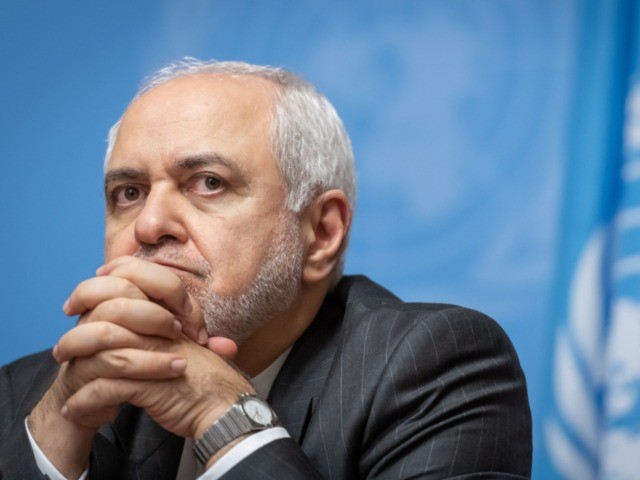JERUSALEM — Iran this morning claimed it is not seeking escalation or war. This after crossing all red lines by sending militias to attack our embassy in Iraq and now launching ballistic missiles at U.S. forces.
The news media has been largely painting the ballistic missile attack on two military bases in Iraq as “retaliation” for the elimination of Iranian arch terrorism commander Qasem Soleimani, forgetting Soleimani was terminated after the unforgivable assault on the U.S. embassy and while reportedly plotting imminent attacks on Americans.
Javad Zarif, foreign minister of Iran, the world’s largest state sponsor of terrorism, tweeted the following:
Iran took & concluded proportionate measures in self-defense under Article 51 of UN Charter targeting base from which cowardly armed attack against our citizens & senior officials were launched.
We do not seek escalation or war, but will defend ourselves against any aggression.
— Javad Zarif (@JZarif) January 8, 2020
Zarif’s misleading statement makes it seem Iran is a victim defending itself against unprovoked U.S. “aggression.” In reality, the U.S. in recent months has shown remarkable restraint in the face of continued Iranian war posturing culminating in the unprovoked organized assault on the U.S. embassy in Iraq. The Pentagon says Soleimani was behind the attack.
It’s a bit too late for Iran to claim it doesn’t seek escalation when that’s all Iran has been doing lately.
And the news media should provide proper context when reporting on the latest events by spotlighting the Iranian action that led to Soleimani’s elimination – the attack on our Iraq embassy.
One would require a wild imagination to believe Iraqi Shiite militiamen backed by Iran orchestrated a breach of the U.S. Embassy compound in Baghdad without direct orders from their paymasters in Tehran. Scores of well-known Iran-backed militia leaders were physically present during the protest and assault.
The brazen U.S. embassy breach came after Iran-backed rebels carried out a series of aerial strikes on oil facilities in Saudi Arabia in September, attacks that this reporter characterized at the time as not a localized issue but a “war on the entire global economy.”
It was clear that Iran was behind those strikes, with many doubting that Houthi rebels possessed sophisticated enough technology and military capabilities to carry out precision air raids that temporarily knocked out half of the Saudis’ energy production.
Prior to the Saudi strikes, Iran seemed to be testing the ground by downing a U.S. surveillance drone on June 20, 2019.
And Iran’s Revolutionary Guard has been asserting itself in the Gulf by repeatedly seizing foreign tankers without a strong reaction from the international community.
Then came the embassy atack, which was arguably an act of war itself. Failing to swiftly and strongly respond would have signaled Iran could get away with future attacks on America.
That’s when the U.S. eliminated Qasem Soleimani, the Osama bin Laden of the Shiite world. Secretary of State Mike Pompeo further explained Soleimani was terminated to disrupt an “imminent attack” he was planning that would have endangered the lives of Americans.
Soleimani was responsible for plotting deadly attacks on Americans. He commanded the al-Quds force of the Islamic Revolutionary Guard Corps, where he oversaw a vast terrorist apparatus for Iran. He essentially controlled Hezbollah and supervised the expansion of Hamas, Islamic Jihad and jihadist militias in Iran, Iraq, Syria, Lebanon, Yemen, the Gaza Strip and West Bank.
Instead of tempering itself, Iran today carried out the most direct attack on America since it seized the U.S. Embassy in Tehran in 1979.
The Wall Street Journal reported on the Iranian attacks in which more than a dozen missiles were fired at U.S. and coalition forces:
The strikes on two bases—Erbil in northern Iraq and the large Al Asad base in western Iraq—began about 5:30 p.m. Eastern time, U.S. officials said.
An administration official said there appeared to be no U.S. casualties at either attack site, but added that “it’s early” and said damage and missile assessments were still under way.
The official said that there are likely some Iraqi casualties, although that number appeared to be low in the hours following the attack.
Iran’s Supreme Leader Ayatollah Ali Khamenei signaled more anti-American assaults by saying the missile attack was “not enough” while calling for the U.S. to be “uprooted” from the region.
Whether Iran attacks America again the next few days remains to be seen. But the current Iranian regime has already proven it’s out of control and must be properly dettered.

COMMENTS
Please let us know if you're having issues with commenting.